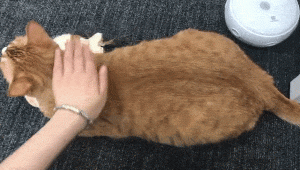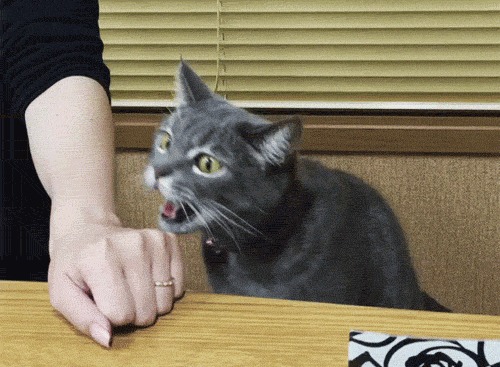Most cat owners have probably experienced this: one moment, your kitten is purring contentedly under your gentle strokes, happily snuggling up to you, and the next second, it suddenly grabs your hand and starts biting! Most of the time, it’s no big deal, but occasionally, you might end up with a few scratches or small bite marks on your hand. In these moments, owners can’t help but feel a bit anxious: “What happened? We were playing so nicely, then suddenly, it turned on me. Does my cat not love me anymore?”
-
Why Do Cats Suddenly Bite?
There are mainly three reasons:① Playful Aggression.Cats need daily hunting games, which include actions such as stalking, chasing, attacking, ambushing, jumping, hitting, scratching, wrestling, and biting. Moving objects often trigger a cat’s predatory instincts. A hand moving around may become its “prey,” prompting an attack. This playful behavior, intended to simulate hunting, is common among kittens and cats under the age of two.② Lack of Proper Training During Kittenhood.Some cat owners may not take kitten biting seriously if it doesn’t hurt or cause bleeding. While playful aggression is common, inappropriate play during kittenhood can reinforce this behavior. If you often play with your kitten using your hands, it may start seeing your hands as “prey.” Once this habit is established, it’s hard to break, and as the cat grows older, its teeth become sharper and stronger, making biting more likely to cause injury.③ Pain or Discomfort.Cats may bite when they’re uncomfortable with the way they’re being petted or if a certain area or pressure bothers them. Experienced cat owners know that petting a cat requires the right technique, pressure, and duration. If your cat feels uncomfortable, it might bite or scratch to let you know to “back off.” Additionally, if a cat is in pain due to illness (such as injury, arthritis, or tumors), normal play or petting can make it feel worse, leading to biting as a way of expressing its discomfort. If a cat that usually enjoys play suddenly starts biting or acting aggressively, it’s a good idea to take it to the vet for further examination.

-
How to Train Your Cat Not to Bite?
① Play Responsibly.First, owners must accept that cats need daily hunting games. Provide them with appropriate playtime and toys that allow them to chase, pounce, and bite. Always use a toy, like a cat teaser, to play with your cat—never use your hands! Playing with a cat teaser not only satisfies the cat’s hunting instincts but also promotes interaction between you and your cat. Start slow with calm movements and gradually increase the intensity of the game, while carefully observing the cat’s behavior. If the cat seems calm, offer praise and small treats as rewards. If the cat becomes too excited or shows signs of aggression (such as exposing its teeth), slow down or pause the game to help calm it down.② Petting in Moderation.While it’s tempting to keep petting your cat endlessly, remember that it’s important to do so in moderation. The joy of petting is for the owner, not always the cat! Too much petting can overstimulate your cat and lead to biting. If you notice that your cat tends to bite after being petted for around five minutes, try stopping at three minutes. Don’t push your cat to the point where it’s overwhelmed. Learn to read your cat’s body language and recognize the signs before an attack occurs. Cats often give subtle warning signs before they bite, such as flattening their ears, turning their body to face you, flicking their tail, or making disgruntled sounds. Ignoring these signals can lead to biting and scratching as the cat tries to tell you to stop.③ Say Goodbye to Incorrect Punishment Methods.Training a cat to develop good play habits takes time and patience, and “failures” are normal during the process. Some owners, however, react to biting by thinking “the cat needs punishment” and use methods like hitting, yelling, spraying water, or even biting the cat back. These methods are harmful and can disrupt your relationship with your cat. While they may momentarily stop the behavior due to fear, they don’t address the root cause and may make your cat more aggressive. Cats are sensitive creatures, and if they associate you with pain or fear, they may become fearful and avoid you. Instead of using punishment, focus on positive reinforcement and understanding your cat’s signals.
Finally, if I don’t provoke my cat and it still bites me, remember to forgive it. After all, when it comes to fighting, it’s not personal…





